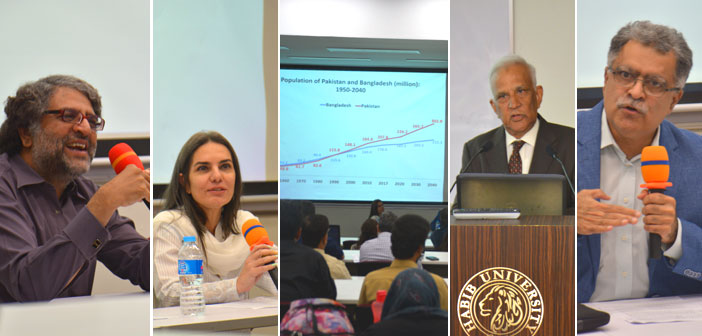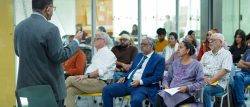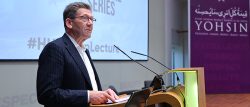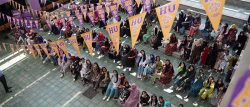The Interdisciplinary Development Research and Action Center (IDRAC) at Habib University hosted three expert panellists to talk on the Implications of Population Census for Inter-ethnic Relations and Resource Distribution in Pakistan on 16th November, 2017.
Recent records of urban and rural Sindh have caused criticism amongst demographics, journalists, and political activists due to mathematical flaws and reports of undercounting. The transgender population of Pakistan is underestimated and people with disabilities are forgotten, causing concerns and demands of holding authorities accountable.
HU’s Associate Professor Dr. Shama Dossa opened the event and welcomed the panellists to share their research findings and recommendations on how the next census could be better calculated.
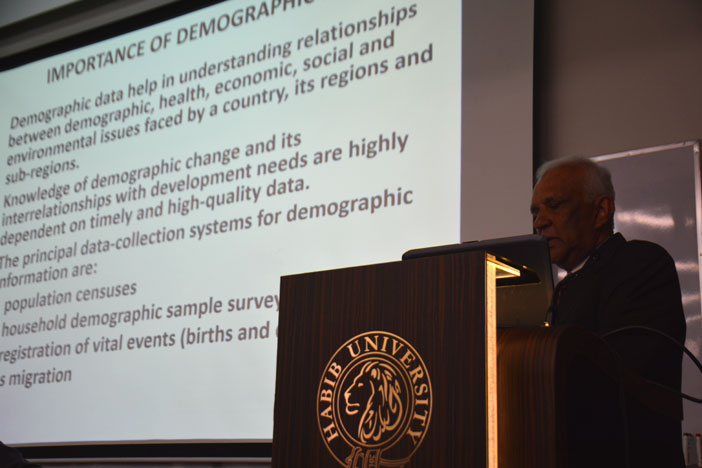 Professor Mehtab S. Karim
Professor Mehtab S. Karim
Professor Mehtab S. Karim began the talk, on the “controversial census” in Pakistan in 2017. As the last one was held in 1998, a massive change was expected to be revealed in the population situation. “In 1998, the census had calculated 132 million in Pakistan, even though the total number was 138 million […] it had 6 million missing people, most of which were from Sindh”. He shared the doubts he had about the 2017 census stating, “I suspected this could happen again in this census […] perhaps there would be some problems in this 2017 census.”
Even though the 1973 constitution states that it is necessary for a census to take place every year, there has been a lack of initiative from the governments. Following the last census in ’98, it took the public offices 17 years, the results of which “surpassed the government’s expectations”.
Three main reasons for a census are to calculate the age and gender of a people, the economic indicators of an economy, and social indicators to better understand the populous of an area. Having calculated the population after almost two decades did have its consequences: “Pakistan has realized how major its population growth has been”. According to Dr Karim, “the way the country is growing, we will be (living in a country with) over 300 million people. In the next two decades alone, we will grow so fast […] we will jump from the 6th largest to the 5th largest country in the world. If remain unchecked, Pakistan will suffer”.
Afiyah Zia spoke next, stating it was in December 2016 “when the supreme court told the government […] to conduct this census.” Perhaps the reason the census became a topic of interest to many was when a six month sentence in jail was ordered for those who did not cooperate with the census. “Unfortunately I think the issue is that we get stuck on the idea of the politics of numbers and not too much into the politics of identity.” Even when speaking in terms of identities, the more in depth the issue has gone into, is the identity of ethnicity and political demarcation: “ethnicity and demarcation, we’re stuck on, and the idea of other identities like gender identities or class identities […] nobody talks about those”. Religious and gender identities, women, transgender, and people of other religious backgrounds (other than Islam), are usually neglected, and “nobody talks about class at all.”
She pointed out two types of ‘missing women’ she came across in her studies: an accidental missing, and a deliberate missing. As a women’s rights activist, she stated the census is an important database to look for information regarding what can be done for women, especially those from the working class. According to her studies, women are given the least incentive in terms of what the census will do for them which is why they do not step up to be a part of it, or even let their identity be known. Reason being, (working class) women are neglected on all fronts: in terms of education, civil rights, and even healthcare. Hearing that the census will allocate more budget to a certain province will not mean their living conditions will be bettered, and so they refrain from making an active effort to be counted in the census.
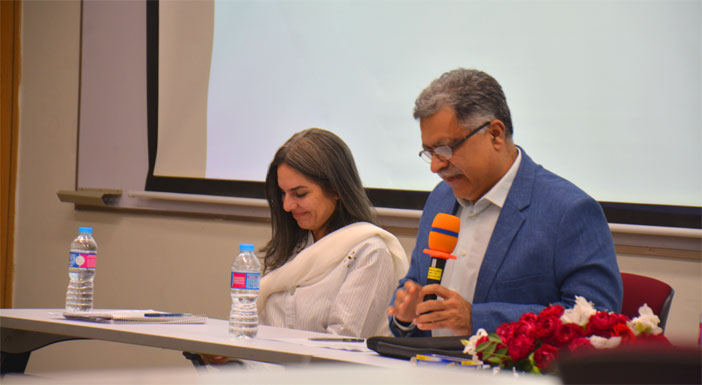 Afiyah Zia (Left) and Dr. Haider Nizamani (Right)
Afiyah Zia (Left) and Dr. Haider Nizamani (Right)
Dr. Haider Nizamani brought to light two main issues with this census, one being time, and the other being military involvement. Granted, while the military was providing security and ensuring no access issues would be encountered, each political group has their own agenda and in Balochistan, for example, their agenda may have been different from what was intended by the census calculation, misconstruing the count altogether.
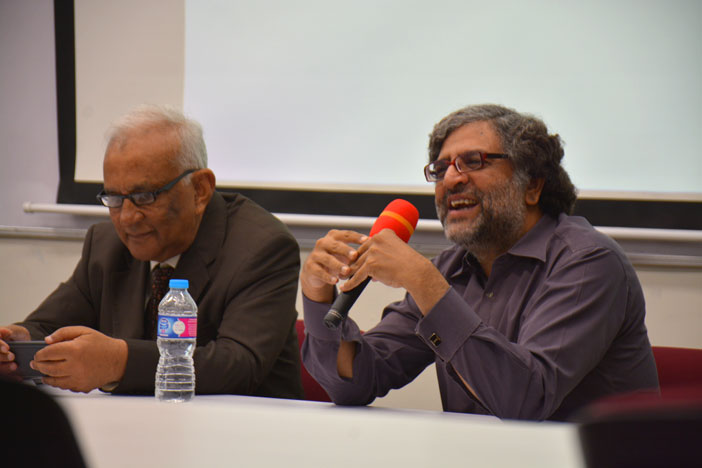 Badar Alam (Right)
Badar Alam (Right)
He also shed light on the question: “Can Pakistan ever do a correct census?” The census conducted in Pakistan in 2017 had to be stopped midway due to problems with the house count. This, according to Badar Alam, was a major issue in Karachi where “certain parties within the city exaggerated the house count of the number of households to increase the numbers of its own constituents.” He pointed out incidents where there were said to be 700 individuals living within a certain household, further stressing on the fact that whether the army was present or not, parties and individuals had their own reasons to play with the consensus numbers. “If we don’t conduct proper exercises […] we will never be able to reach numbers that will satisfy us.” he said.
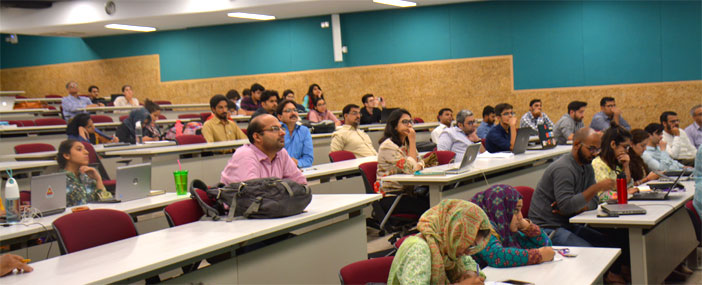
The floor was opened to questions from the audience which included an understanding of what over-counting and under-counting looked like, questions of legitimacy and the correct mathematics used for analysis, and a debate on why the census in Pakistan is such a broad issue that leaves us unable to tackle it. Gender, being an already controversial issue in Pakistani societies, dulls the impact correct counting of women and girls would and should have on our constituents. “We must challenge the state,” said Afiyah Zia, as the state must not just be called out but held accountable to the injustices that are very apparent in the fabric of our behaviors in a male-dominated state. Ethnicities too, have been discounted due to constitutional developments and barriers being created.
The panel of speakers concluded that women and minorities suffer most from the miscounting of the consensus as they are oftentimes left behind in policy changes and any social developments in the country.
The event was covered by TheNews.

